Cruising in Europe: Learning to be Flexible
In February 2020, Helen and Stephen Shrewsbury cast off the shackles of their old lives in New Zealand and flew to the UK to find a suitable boat and follow their dream of cruising the world. In this report, Helen offers some advice to those hoping to do something similar.
Published 3 years ago
Reprinted with kind permission of Island Cruising NZ.
Memories not dreams
From an early age I dreamed of living on a boat and sailing the world. I was almost certainly influenced by my parents who, for as long as I can remember, talked about the day they were going to set off and sail round the World, a dream that was never fulfilled. They got as far as sailing from Scotland to The Azores in their 27ft boat and decided long distance sailing was not for them. Hardly surprising when you consider it was before GPS, AIS and good weather forecasting and they were in a small boat, lovingly built by my father in our backyard!
We had arrived in the UK in March 2020, just as the pandemic was starting to take hold and nations were going into lockdown. Our original intention, of buying a boat in Europe and spending the summer of 2020 cruising The Mediterranean, was fast becoming an unrealistic dream. As it turned out – and due to our flexible plans – we were lucky and found the right boat in England. When we bought Cerulean (a 43ft Bluewater, custom built boat) a few years after the death of both my parents, part of me felt I was not only fulfilling my dream, but those of my parents too. Our boat is vastly different from the one dad built, with much more space, all modern equipment, seakindly and very comfortable.
To honour mum and dad in the months following us buying Cerulean, we sailed her on a pilgrimage back to their beloved home on the West Coast of Scotland. In fact our shakedown sail included a wonderful summer of sailing along the south coast of England to Cornwall, Isles of Scilly, West Wales, Northern Ireland and the West Coast of Scotland. It was a perfect way for us to get to know Cerulean and for us to understand and prioritise the work that needed to be done to make her ready for the long passages we were planning to undertake, before returning to Cornwall to refit the boat in preparation for the start of our long sail home.

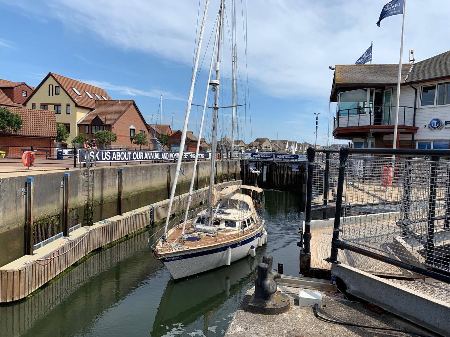
- Navigating a lock was just one of the many “obstacles” to overcome when cruising in UK and European waters.
Cleaning, scraping, rubbing, brushing……
We spent the cold winter of 2020/21 in Falmouth, England, working on the boat almost every day. We stripped her, both inside and out, removing the sails, running rigging, mast, squabs, engine and canvas, in fact everything that made Cerulean a boat! We cleaned, scraped, rubbed, squirted, prodded, brushed, screwed and stuck everything we could. After years of neglect, we serviced winches, steering, propellor, seacocks, liferaft and cooker. By the time we left the yard five months later we had new sails, canvas, rigging, battery management upgrade, solar panels and engine. We had focused on the items we knew we had to rely on to get us safely across the Atlantic and beyond, sticking to a pre-determined budget as we continued to review whether an item was a need or a want!
Starting the long sail home
In early June 2021 we left UK waters and set off on our first multi-night passage, crossing The Bay of Biscay and arriving in Spain at the start of our long sail home. We both really enjoyed the crossing, which was essentially a make or break for the trip as I had limited long distance sailing experience and Steve had none! His first taste of sailing was on my Whiting 29 when we sailed her from Lyttelton to Mana Marina in Wellington when I relocated to Auckland three years earlier. If that hadn’t gone well we would not be where we were now but, in the same vein, if the Bay of Biscay passage had been a disaster, we would have questioned our ability to continue our safe journey home. Thankfully we did not encounter any Orcas, which were ever-present around boats on a fairly regular basis in the waters we were sailing, and enjoyed some wonderful sails and experiences as we made our way south along the Spanish and Portuguese coastline.
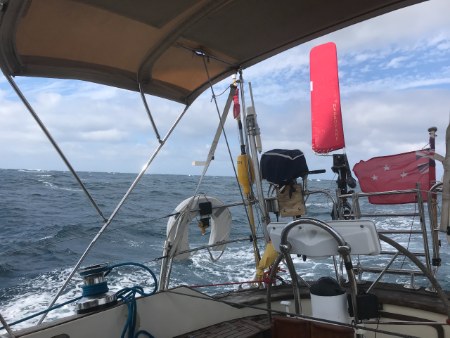

There were many obstacles we had to negotiate before we left the UK, to make sure our time in Europe and beyond was as stress free as possible. Here are just a few of those obstacles and, with the benefit of 20/20 vision, some of the things we wished we’d known but learned the hard way.
Dealing with Schengen area countries
If there is one word to live by when cruising in Europe it is “Flexibility”. As a New Zealand registered boat cruising in Europe, with one dual UK/NZ and one NZ passport holder, trying to understand Schengen and the trials and tribulations of Brexit was a bit of a minefield!
We spent long hours researching the best places to visit and planning our Schengen calendar to fit in with the time restrictions, known to cruisers as “the Schengen Shuffle”. Only spending 90 days in the Schengen area, which includes most European countries, was going to severely restrict the amount of time we could spend cruising in the region. We had read on www.safetravel.govt.nz that some Schengen countries “allow New Zealanders to spend a limited time (e.g. up to three months) in a particular country for business or tourism, without reference to time spent in other Schengen area countries.”
Armed with this information, we wrote to the NZ Embassies of the Schengen countries we intended spending time in, namely France, Spain and Portugal, referring them to the website wording and asking them to confirm whether the bilateral visa waiver agreement would be honoured. We received positive responses from France and Spain but Portugal gave a flat “no”.
Once again, our plans needed to be flexible when France closed all their borders due to Covid and, instead of exploring the beautiful coastline and towns of Brittany on our way south, we had to miss out on France all together and instead, headed across the Bay of Biscay to La Coruna in Spain.
As we would be leaving the Schengen area from Spain after spending time in Portugal, we figured that, providing we could show where we had been cruising and as long as we had not spent more than 90 days in each of the Schengen countries, we would be fine- and this proved to be the case.
Checking in/out of Europe
Checking in to Spain was easy and painless. The lockdown restrictions had just come to an end and they weren’t even interested at looking at our Covid vaccination certificates. We were now in the Schengen region and were not required to visit immigration again until we left the Schengen area. While in Spain we were boarded once by customs who checked our VAT status, immigration papers and boat insurance certificate. In the four months we spent in Europe, that was the only time we were asked for papers, except when we checked in to marinas or entered Madeira. At no time did anyone ask to see our ICC certificate or any other sailing qualifications.

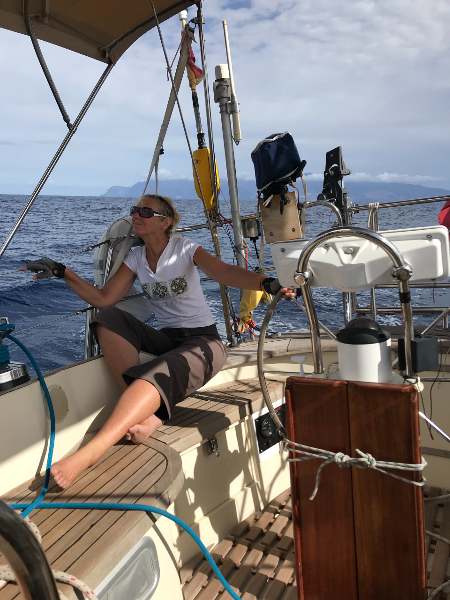
- Helen following her dream, at the helm of Cerulean.
We checked out of the Schengen region in the Canary Islands. Checking out of The Canaries can be a little tricky, particularly if, like us, you want to explore the smaller, outlying islands (which are some of the best places to visit). La Palma, El Heirro and La Gomera have no official check out facilities. We were able to unofficially check out at El Heirro, but we were only provided with a stamp on a photocopied page of our passport, which does not formally stop the Schengen clock ticking. To do this we would have had to return to Tenerife which would have been a hard slog to windward. We were told that Cape Verde would accept the documentation given us by the marina at El Heirro and this proved to be the case on arrival in Sal, Cape Verde. However, we have not yet tested re-entering a Schengen country, so will let you know how that goes!
VAT in the UK
Since Brexit, Britain has changed the process that allowed non-residents to claim back VAT on certain items. It is now at the discretion of the supplier whether or not the VAT should be paid and the best policy is, providing you are leaving the country within three months of the date of the invoice, try to get the supplier to agree that you do not pay VAT in the first place. I had long conversations with HMRC (Tax office) and the suppliers to try and find the correct policy to refer the suppliers to so they felt confident a refund was appropriate. In the end most of the suppliers refunded our VAT, but we’re still waiting for the sailmaker to repay us even though every bit of the required documentation has been provided.
Insurance
Insurance is the most talked-about subject for cruisers, as it is getting more difficult finding a company that will insure yachts, particularly it seems, New Zealand registered boats. Topsail Australia were great while we were in Europe, but as soon as we left The Canaries they would not insure us. We were left scrabbling around trying to find an insurance company – any insurance company – that would insure us. As soon as we mentioned we were a New Zealand registered boat, we were immediately turned down with no explanation, even though we had a recent survey and our rigging was new. We ended up going with Pantaenius, who were about double the price of Topsail and the cover was not as good. In hindsight we believe it would have been better to keep the boat registered in the UK as it would have given us more options.
Sim Card/Data
As we were in the UK for over a year, we had a Vodafone plan which included 25GB data in Europe. However, once we had been out of England for four months this abruptly ended with very little warning, so we purchased a Spanish SIM card which gave us 40GB of data for 20 Euros a month. We could top up on line and hotspot off one phone to save purchasing a second SIM. When we left Europe, sorting a SIM card was the third most important thing to do after checking in and finding the nearest ATM!
Social Media
I put my hand up and admit that, much to Steve’s chagrin, I do spend a little time on social media. However, this has proved invaluable as we have not only met lifelong friends, but also learned a lot about local events, updated arrival information, local advice and possible buddy boats. There are Facebook pages that cover most countries/cities and we connected with these a few weeks prior to arrival. Being flexible allowed us to change our arrival date if we discovered there was a national holiday on the day we had planned to enter the country.
Bank Accounts/Cash
As our longer travel plan included going further afield than just Europe, we needed to find a bank that offered good exchange rates so our currency, which was in both NZ dollars and GB Pounds, was not whittled away and ending up in the bank coffers instead of ours! We opened an account with Starling – an online bank – which met all our requirements and continues to impress us with the wonderful on-line tools they have to help us manage our money at very low fees. We found it was a good idea to have a few hundred Euros handy, particularly in places like Spain, The Canaries and Cape Verde, as check in procedures often included paying a small fee, and usually there were no ATM’s nearby the port.
Provisioning
We took advantage of whenever good, well stocked supermarkets were on hand, and replenished our stores whenever possible. We kept our provisions well stocked as we knew we would be traveling to places where we would have less choices and certain foods would be harder to find – this included tins including tomatoes, corn and beans. We bought dairy produce whenever we could and kept our butter and cheese in separate containers in the fridge to stop the butter taking on the smell of the cheese. Fresh milk was hard to find as soon as we left mainland Portugal, so we stocked up on oatmilk which lasted us until we reached the Caribbean. We stored rounds of cheese, pumpkin and potatoes in the bilge where it was cool and dark, regretting we had not bought more cheese in Spain before leaving.
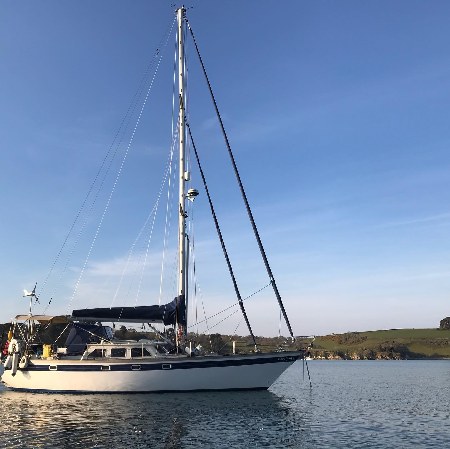

Boat maintenance
Portugal is the best place to do any boat maintenance with a good selection of reasonably priced boatyards. Bruce’s Yard in Faro was excellent value and was the preferred yard for cruisers as they allow liveaboards to stay on the boat. The yard is clean and has excellent workshops and facilities to enable you to work on the boat. It is also a stones-throw from the airport and some well stocked chandlers.
The Freedom to Change Plans
One of the many wonderful things about cruising without deadlines is the freedom to change your plans, which we did constantly as new opportunities arose. After meeting some fellow cruisers in Portugal, we decided to change our mind about crossing the Atlantic early in the season and instead head to Senegal and Gambia before continuing to Cape Verde. It was the best decision of our trip and we experienced a taste of life in a third world county that we will remember for the rest of our lives.
Gambia gave us a window into the lives of a young country where the people are struggling to survive in a harsh, but beautiful environment, abundant in wildlife and nature but a country desperate to improve their subsistence living conditions and clutching any opportunity which may present them with a way to improve the lives of their families. Gambia is not on the normal well travelled route to cross the Atlantic and involved a 960NM passage from The Canaries along the West Africa coastline. We made an unplanned stop in Dakar, Senegal, for a week as our buddy boat experienced some damage during bad weather we encountered as we headed south and Dakar proved to be an excellent place to get sails and canvas repair.
Senegal Yacht Club has a fabulous sailmaker/repair/canvas guy who works fast and produces excellent results. We had some dinghy chaps made in three days and cost Euro 250 including material. Worth the trip if only to get work done!
We spent a month in Africa, traveling up The Gambia River to where hippos wallow on the mud banks close to mangroves and paddy fields, where brightly coloured birds fill the skies and where the smiles of children are as wide as the fast flowing river we traveled up. We celebrated Christmas in a country where Muslims and Christians respect and recognise their different religions and woke to the sound of the call to prayer at sunrise and then was welcomed at 8am by a local “boat boy” wishing us a “Happy Christmas” when bringing fresh bread to the boat.

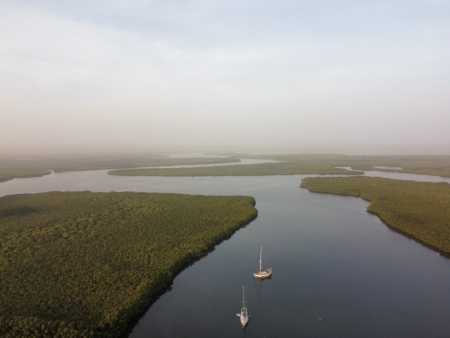
- SY Cerulean and SY Ruffian up river in The Gambia. Drone photo (c) SY Ruffian.
The Atlantic Crossing Challenge
Our adventures continued in Cape Verde and then, our biggest challenge – crossing the Atlantic to The Caribbean. We had spent 18 months preparing the boat and ourselves for this moment and both of us felt ready to take the leap of faith and jump off at Mindelo into the deep waters of the Atlantic ocean. We had waited for the right weather window, which proved to be a good one as we experienced calm seas for most of the 2000NM crossing to Grenada. We both loved our time crossing the Atlantic, arriving 17 days later exhilarated, proud and happy. Most importantly we really enjoyed the time we spent together. For the last two years we have seldom been more than 43ft from each other, yet we continue to laugh, love, respect, trust and challenge each other.
Follow your Dreams!
Since leaving New Zealand in March 2020, our travels have so far taken us around the UK, Spain, Portugal, Madeira, The Canaries, Senegal, Gambia, Cape Verde and across the Atlantic to the Caribbean.
As we continue our adventure exploring the many and varied islands of the Caribbean we often reflect on what we have achieved so far and how fortunate we are to be able to live this life. However, the decision to choose this lifestyle was not a hard one but it is the decisions made earlier that are the hardest – choosing when to resign from your job, dealing with the pain of separation from loved ones, buying the right boat and having confidence in your own abilities. My parents chose not to follow their dreams. I’m so happy I chose to follow mine.
Being flexible with our plans and saying yes to new opportunities that present themselves has meant we have loved every step of the journey. If there is one piece of advice we’d offer for those with dreams of doing something similar, it is, JUST DO IT! You will have no regrets if you do, but bound to have them if you don’t!
Helen Shrewsbury
SY Cerulean
……………………………………………………………………………………………………………………………………….
About the Author
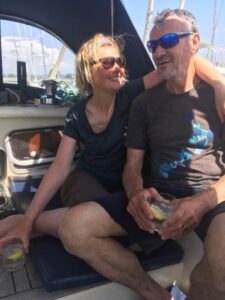

They keep a blog of their adventures – www.handsondeck.co.nz.
………………………………………………………………………………………………………………………………………….
The opinions expressed in this article are the author’s own and do not reflect the view of Noonsite.com or World Cruising Club.
Related Reports:
Related to following destinations: Canary Islands, Cape Verdes, Gambia, Scotland, South Coast, United Kingdom
Related to the following Cruising Resources: Cruising Information, European Union, Planning and Preparation



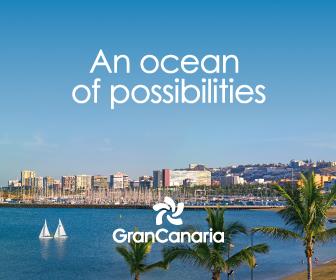

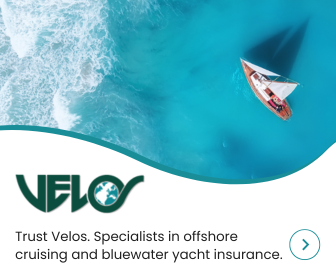
Thanks for posting Helen, instructive for future circumnavigators;)! kindest regards, Inge (SV ‘Ya’)